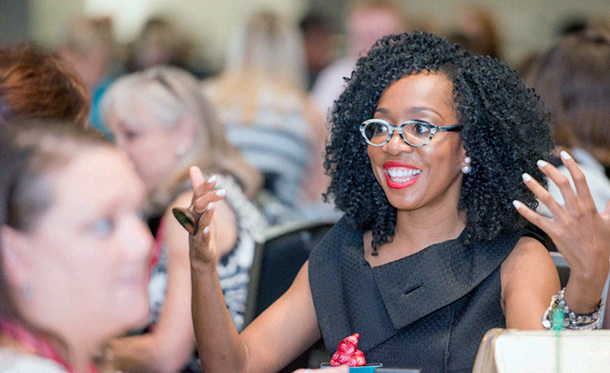When Priti Krishtel was accepted to the Echoing Green fellowship, a global organization that supports social entrepreneurs, she knew it would change the fate of her nonprofit. As the co-founder of I-MAK (Initiative for Medicines, Access and Knowledge), Krishtel works to make lifesaving drugs more accessible and affordable by repairing the medical patent system (a factor in the rising cost of drugs) through strategic litigation with drug companies. Echoing Green would give Krishtel and her co-founder support to build the business. But Krishtel got an unexpected bonus: the friendship and mentorship of Cheryl Dorsey, the president of Echoing Green.
The two women sound off on finding people you connect with, building your own networks and bridging gaps in industries and communities.

Women Entrepreneur: Priti, tell me how you first met Cheryl?
Priti Krishtel: In 2006, when my co-founder, Tahir Amin, and I decided to start I-MAK, one of our board members really wanted us to meet Cheryl. He had been a former Echoing Green fellow and wanted us to be a part of the community. So in 2007, I had my finalist interview and met Cheryl.
Cheryl Dorsey: Priti is being humble. They were 2008 Echoing Green fellows, but the journey to get there is quite onerous of not downright Darwinian. Every year we get over 2,000 applications from 160 countries, and we only make 20 or so new investments a year. Less than 2 percent who apply make it.
WE: Does the program have a formal mentorship aspect, or did your relationship develop more organically?
CD: It’s certainly both. As part of the program, there’s an organizational imperative to invest in these emerging leaders, and we do have a suite of resources that could be labeled institutional mentorship. But it’s personal, too. I’m a woman of color — one of the only women of color running a social entrepreneurship program in this community. So there are people in our community, women of color, that I’m drawn to. You develop deep and lasting relationships, not just working relationships, but a lifelong commitment to staying engaged with one another and sharing professional and personal journeys.
PK: When I first got to New York in 2007, I had come from India. And here was this woman standing before me who had gone to Harvard Medical School, had run her own mobile health unit and now was the president of Echoing Green. But there was an immediate connection. I wanted to learn from her.
WE: What challenges has Cheryl helped you work through?
PK: Mobilizing resources in the early days was a huge challenge. There’s a scarcity mentality in the industry; it’s not normal for people to extend that hand and help you raise money. But Cheryl facilitated an intro to a billionaire, giving us the support we needed to really grow I-MAK. Cheryl truly believes the pie can always get bigger, and that’s something I’ve learned from her. And more recently, in 2014, we were at an inflection point, poised for growth. She convinced me to do what a lot of social entrepreneurs don’t: invest some of my tough-earned, rainy day, piggy bank money, to grow the business. And I did. Through targeted investments we ended up getting coverage everywhere from the New York Times to CNN. This led to a major foundation investing in us, which really took us to the next level. Cheryl is so invested in making sure that as a woman and a leader I don’t miss a beat.
CD: I’m not supposed to cry in our interview!
WE: Cheryl, did you have a similar support system in your own career?
CD: When I was in med school, so many years ago, I was introduced to an incredible woman of color, Dr. Nancy Oriol. She was teaching at Harvard and working on racial disparities in inner city Boston. We started talking about black infant mortality rates in Boston, which in the late 80s were three times higher than the rate of white babies. It was horrific and disgraceful, but even more so that it was happening in the backyard of one of the world’s best medical industries. We started talking about what we could do, and that’s how we came up with our mobile health unit. We worked together on this, sitting at her kitchen table while her kids were running around. She became one of my best friends, partner and mentor. I used to call her Dr. Nancy Oriol, and she finally told me I couldn’t come back to her house until I called her just Nancy. I always thought she gave me everything and I gave her nothing, but she finally got through to me: mentorship is bidirectional. She has said she’s learned as much from me as I have from her. And Priti here has said lovely things about me, but I have also learned so much from her. The next generation keeps us engaged. Mentorship is a conversation for life.
WE: As you both have built your own networks around your respective careers, how valuable have those homegrown communities been?
PK: Networks are critical and coalitions are critical. There’s not enough structure and support for this idea of women in leadership and women of color in leadership. They need structure and support to learn from each other and advance the issues we care about. History changes when women have been brought together. It’s a critical gap that I’m hoping can change.
CD: There’s a need to not just build our own networks but to create shared social capital, but we have to build bridges across networks. Social entrepreneurs tend to be disruptive. It is an alliance-based model of change. You are working on difficult issues, and you have to find a way to engage your adversary. The best leaders, like Priti, understand that you have to reach out your hand across the proverbial aisle.

